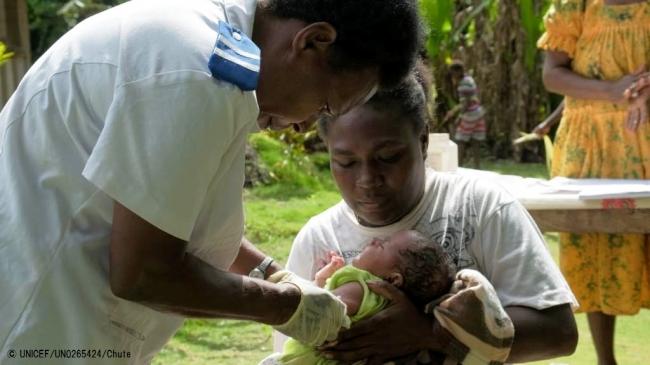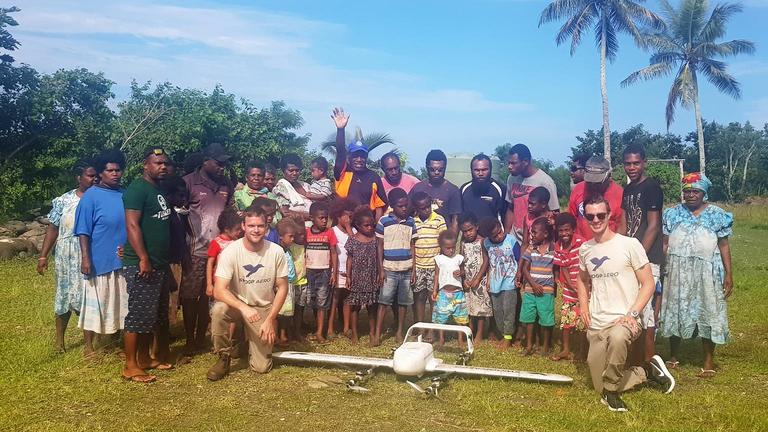"Beats Flex-fragment design special edition" is now on sale on Apple's official website
11/03/2022

[December 18, 2018 from Port Vila (Vanuatu) / New York]
In the South Pacific country of Vanuatu, one-month-old Joy Nowai became the first child in the world to receive a vaccine delivered to a remote island by private small drone drone.
© UNICEF/UN0265424 /Chute |
Miriam Nampil, a nurse delivering the first vaccine delivered by drone. |
The range of the vaccine is approximately 40km from the rugged mountainous terrain of Dillon's Bay in the west of the island to the remote Cook's Bay in the east. , where 13 children and 5 pregnant women were vaccinated by licensed nurse Miriam Nampil. Cook's Bay is a small, dispersed community with no health center, no electricity, and inaccessible except on foot or by small boat.
"Today's drone delivery may be small, but it's a huge step forward for global health," said UNICEF Executive Director Henrietta Fore. “Vaccination of children in the most remote areas remains challenging, but drone technology can make a difference by crossing that last mile. ”
Vaccines have transportation difficulties because they need to be carried at a certain temperature. With warm temperatures, more than 80 mountainous and remote islands spread over a range of about 1,300 km, and limited roads, Vanuatu presents a particularly challenging environment for vaccine transport. As a result, about 20% of the country's children, or one in five, miss out on necessary vaccinations in childhood. *
"When crossing rivers, over mountains, walking in the rain, over rock ledges, it's hard to carry a cooler to keep vaccines cool. I often use boats. But we often have to cancel flights due to bad weather," said Miriam Nampil, the nurse in charge of the first drone-delivered vaccinations. “Vaccine journeys are always long and arduous, so I can only go to vaccinate my children once a month. We are hopeful that we will be able to get vaccines to children of all ages.”

During the drone delivery to Erromango, the vaccines were delivered in Styrofoam boxes with ice bags and temperature recorders. An electronic indicator is activated if the temperature of the vaccine is out of tolerance.
© UNICEF/UN0265396/Pacific |
Drone transport test with Swoop Aero. |
Last week's transport trial saw the Vanuatu Ministry of Health, in partnership with UNICEF, pilot two drone companies, Swoop Aero and WingCopter. We conducted a drone transport test. Australia's Swoop Aero, the key to the success of today's drone transport, is able to drop a payload within 2m of its target after crossing many islands and waypoints for 50km. successfully passed the first phase of the trial.
It is also the first time in the world that a government has signed a contract with a private drone company to transport vaccines to remote areas. Drone pilots are selected after the bidding process and are responsible per contract and will not be paid for unsuccessful deliveries.
From a long-term perspective, the government of Vanuatu plans to integrate drone delivery of vaccines into the national immunization program and consider using drones for a wider range of purposes, such as transporting health supplies. The data obtained from the transport tests will also be used to consider how drones can be used commercially in countries around the world facing similar situations.
“The first-ever vaccine shipment has huge potential not only for Vanuatu, but for the thousands of children who are not getting vaccines around the world,” Fore said. "It's a great innovation and unlocks the potential of private companies to do more to help the world's children."
The project is led by the Ministry of Health and Civil Aviation Authority of Vanuatu, with funding from UNICEF, innovationXchange from the Australian Department of Foreign Affairs and Trade, and The Global Fund to Fight AIDS, Tuberculosis and Malaria. We are cooperating.
*Vanuatu Vaccination Rate Survey 2016
[Related page]
Share